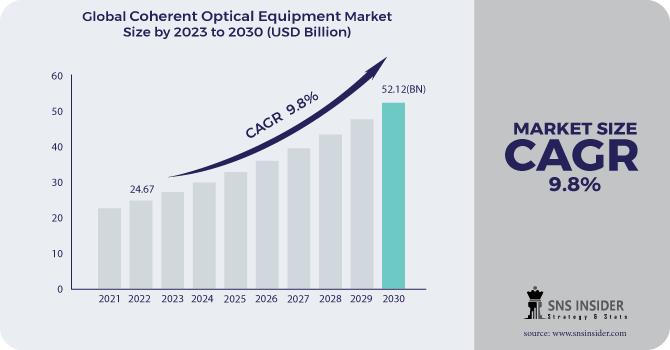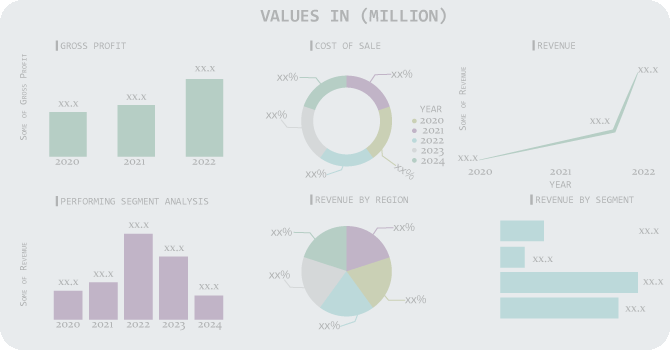Coherent Optical Equipment Market Report Scope & Overview:
The Coherent Optical Equipment Market Size was esteemed at USD 24.67 billion in 2022 and is supposed to arrive at USD 52.12 billion by 2030 and develop at a CAGR of 9.8% over the forecast period 2023-2030.
The Coherent Optical Equipment is the arrangement of gear that is equipped for giving rapid information transmission. It is essentially an optical fiber link that furnishes a speed of 100G+ with a better volume of data and adaptable limit. The strategies, for example, abundancy and stage tweak of light with transmission across two polarizations are acquainted to improve the sound optical transmission. It widely finds its application in the server farm, organizing, and different enterprises like avionics, energy, and others. The developing need to embrace new IT game plans with present-day client inclines over the world is driving the interest in Coherent Optical Equipment.

To get more information on Coherent Optical Equipment Market - Request Free Sample Report
Coherent optical hardware serves for reasonable optical transmission by adjusting the plentifulness and period of the light through the optical transporter. The innovation utilized permits the vehicle the more data through a fiber optic link. The innovation consolidated in cognizant optical hardware drives to achieve a vehicle speed of 100G and past that implies it is equipped for conveying the terabits of data across a solitary fiber pair. The developing requirement for a quicker movement of information to lessen the issues concerning dormancy adds to the rising interest in the market.
The requirement for network and transmission capacity has been becoming attributable to advancements in innovation. The sound optical gear market is encountering huge development attributable to the rising interest in the new limit organization. With the fast speed of advancements in both remote and wired systems administration space, network access suppliers, link and remote suppliers add to the developing requirement for high velocity and transmission capacity. The rising requirement for high velocity and transfer speed is inferable from the development of the server farm, which is considered the huge framework that is expected to serve the information needs of individuals and different IT associations. The server farms contain the expandable volume of information and subsequently prompt expanding necessity and in turn, drive the development of the market.
Market Dynamics
Driving Factors
-
Developing the need to embrace new IT arrangements with current customer patterns across the world.
-
Expanding interest in high-velocity data transmission from the telecom business.
Restraining factors/Challenges
-
High starting venture.
Opportunities
-
Mechanical advances in the field.
-
Network access providers, telecom expert associations, open divisions, and particular endeavors are extensively using reasonable optical gear.
Market Estimation
By Equipment
Given Equipment, the market is divided into Modules/Chips, Optical Amplifiers, Optical Switches, Wavelength-division multiplexers (WDM), and Others. The WDM represented the biggest piece of the pie and is projected to develop at the most noteworthy CAGR of 9.82% during the estimated time frame. Optical Switches was the second-biggest market. The WDM portion is maybe going to be driven by the interest for 100G+ sound frequencies. Particularly notable hardware upholds in multiplexing of numerous optical fiber carrier signals into a lone fiber optic connection by using different frequencies of light. the best-favored point of view of WDM is that it can convey various frequencies in a singular fiber connection.
By Application
Given Application, the market is divided into Original Equipment Manufacturers (OEMs), Networking, Data centers, and Others. Out of these, organizing applications in Coherent Optical Equipment represented driving the piece of the pie. Organizing represented the biggest piece of the pie and is projected to develop at the most noteworthy CAGR during the estimated time frame. Organizing is a kind of optical correspondence that relies upon optical speakers, LEDs, lasers, and WDM to communicate information through a channel (typically by optical fiber). It's fit for communicating information with the most extreme conceivable transfer speed and least potential misfortunes.
By End-User
Given End-User, the market is divided into Industries, Public Sector, Service providers, and Others. The specialist co-op area is the main client of Coherent Optical Equipment in this fragment, because of the growing interest for quick exchange speed from network access providers and telecom specialist co-ops. A specialist organization represented the biggest portion of the overall industry and is projected to develop at a CAGR during the conjectured time frame. Ventures were the second-biggest market.
By Component
Given the Component, the market is bifurcated into Laser, DSP, Transmitter, Receiver, and Modulator. DSP represented the biggest piece of the pie and is projected to develop at a CAGR during the estimated time frame. The laser was the second-biggest market in 2021. In an optical lucid blender, cognizant recognition utilizes a laser set to a specific recurrence as a nearby oscillator (LO) that "intradynes" with the got signal. As a result of the speed and complexity of these calculations, modified Digital Signal Processors (DSP) with explicit chips have been created. They utilize the most cutting-edge 7nm chip innovation.
Key Market Segmentation
By Equipment
-
Modules/Chips
-
Optical Amplifiers
-
Optical Switches
-
Wavelength-division Multiplexer (WDM)
-
Others
By Application
-
Original Equipment Manufacturers (OEMs)
-
Networking
-
Others
By End-User
-
Industries
-
Public Sector
-
Service Provider
-
Others
By Component
-
Laser
-
DSP
-
Transmitter
-
Receiver
-
Modulator
.png)
Need any customization research on Coherent Optical Equipment Market - Enquiry Now
Regional Analysis:
-
North America
-
USA
-
Canada
-
Mexico
-
-
Europe
-
Germany
-
UK
-
France
-
Italy
-
Spain
-
The Netherlands
-
Rest of Europe
-
-
Asia-Pacific
-
Japan
-
south Korea
-
China
-
India
-
Australia
-
Rest of Asia-Pacific
-
-
The Middle East & Africa
-
Israel
-
UAE
-
South Africa
-
Rest of Middle East & Africa
-
-
Latin America
-
Brazil
-
Argentina
-
Rest of Latin America
-
The market in North America is expected to contribute essentially to income soon, trailed by the Asia Pacific, because of an enormous base of existing clients in the district. North America and Europe have developed districts of the cognizant optical gear market with regards to specialized mindfulness among clients. This is probably going to add to the decrease in the piece of the pie of these districts. Besides, the market in APAC and the Middle East, and Africa is probably going to grow at a hearty CAGR before long.
Key Players
The Major Players are Ciena Corporation, Cisco Systems, Inc., ECI Telecom Ltd, Fujitsu Limited, Huawei Technologies Co., Ltd., Infinera Corporation, NEC Corporation, Nokia Corporation, Telefonaktiebolaget LM Ericsson, ZTE Corporation and Other Players
Cisco Systems, Inc-Company Financial Analysis

| Report Attributes | Details |
|---|---|
| Market Size in 2022 | US$ 24.67 Billion |
| Market Size by 2030 | US$ 52.12 Billion |
| CAGR | CAGR of 9.8% From 2022 to 2030 |
| Base Year | 2022 |
| Forecast Period | 2023-2030 |
| Historical Data | 2020-2021 |
| Report Scope & Coverage | Market Size, Segments Analysis, Competitive Landscape, Regional Analysis, DROC & SWOT Analysis, Forecast Outlook |
| Key Segments | • By Equipment (Modules/Chips, Optical Amplifiers, Optical Switches, Wavelength-division Multiplexer (WDM), Others) • By Application (Original Equipment Manufacturers (OEMs), Networking, Data Center, Others) • By End-User (Industries, Public Sector, Service Provider, Others) • By Component (Laser, DSP, Transmitter, Receiver, Modulator) |
| Regional Analysis/Coverage | North America (USA, Canada, Mexico), Europe (Germany, UK, France, Italy, Spain, Netherlands, Rest of Europe), Asia-Pacific (Japan, South Korea, China, India, Australia, Rest of Asia-Pacific), The Middle East & Africa (Israel, UAE, South Africa, Rest of Middle East & Africa), Latin America (Brazil, Argentina, Rest of Latin America) |
| Company Profiles | Ciena Corporation, Cisco Systems, Inc., ECI Telecom Ltd, Fujitsu Limited, Huawei Technologies Co., Ltd., Infinera Corporation, NEC Corporation, Nokia Corporation, Telefonaktiebolaget LM Ericsson, and ZTE Corporation. |
| DRIVERS | • Developing the need to embrace new IT arrangements with current customer patterns across the world. • Expanding interest in high-velocity data transmission from the telecom business. |
| RESTRAINTS | • High starting venture. |

